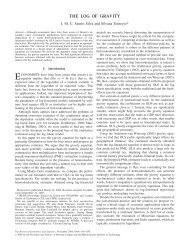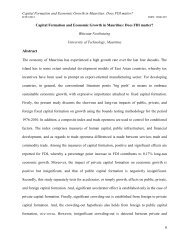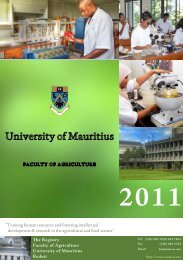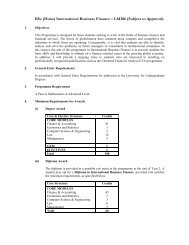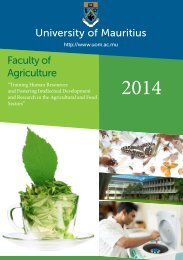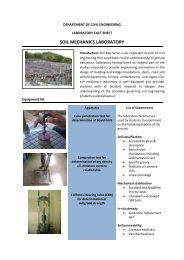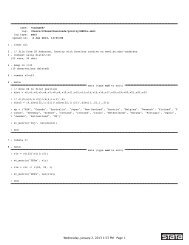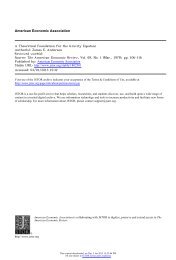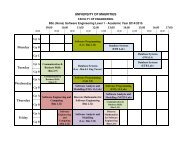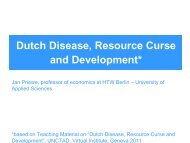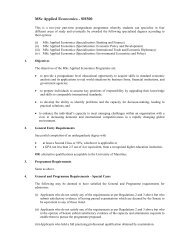SACU Revenue Sharing Formula - the University of Mauritius
SACU Revenue Sharing Formula - the University of Mauritius
SACU Revenue Sharing Formula - the University of Mauritius
You also want an ePaper? Increase the reach of your titles
YUMPU automatically turns print PDFs into web optimized ePapers that Google loves.
ICITI 2012 ISSN: 16941225expense <strong>of</strong> <strong>the</strong> poor areas. In recognition <strong>of</strong> this process, it is necessary to make some provisionfor <strong>the</strong> automatic redistribution <strong>of</strong> resources towards <strong>the</strong> poorer partner. The BotswanaGovernment will <strong>the</strong>refore seek to negotiate with <strong>the</strong> Government <strong>of</strong> <strong>the</strong> Republic <strong>of</strong> South Africaa more equitable customs arrangement. (emphasis added)13 http://www.sacu.int/main.php?include=docs/legislation/1969-agreement/main.html, see also Republic <strong>of</strong> SouthAfrica, 1969. “Customs Union Agreement between <strong>the</strong> Governments <strong>of</strong> <strong>the</strong> Republic <strong>of</strong> South Africa, <strong>the</strong> Republic<strong>of</strong> Botswana, <strong>the</strong> Kingdom <strong>of</strong> Lesotho and <strong>the</strong> Kingdom <strong>of</strong> Swaziland”, Government Gazette, vol. 54(2584)14 The revenue sharing equation can be presented in <strong>the</strong> following mannerWhereR sa = South African revenue from <strong>SACU</strong>M i = CIF Imports <strong>of</strong> country iP i = Value <strong>of</strong> dutiable goods produced i ( Botswana, Lesotho and Swaziland)This in turn created <strong>the</strong> possibility that if :Or15 See Gibb (1997:p 78), Lundahl (1991), Mayer and Zurendra (1994, p.36)16 de Melo, et al found <strong>the</strong> <strong>the</strong> BLS benefited for <strong>the</strong> <strong>SACU</strong> agreement as a whole. Analyzing a number <strong>of</strong> tradeagreements <strong>the</strong>y found that <strong>the</strong>re was no evidence that regional integration among developing countries exerted apositive effect on income and growth, except in <strong>the</strong> case <strong>of</strong> <strong>the</strong> Sou<strong>the</strong>rn African Customs Union (<strong>SACU</strong>) wherefavorable growth effects were found for Botswana, Lesotho and Swaziland. The authors suggested several channelsthrough which regional integration could alter economic outcomes for <strong>the</strong> better. One <strong>of</strong> <strong>the</strong> important avenues isthat regional trade agreement results in a larger political community which might lessen <strong>the</strong> scope for adversediscretionary actions by governments, and in particular restrict <strong>the</strong> power <strong>of</strong> growth-retarding political interestgroups, unless politically powerful lobbies can form alliances across countries. In <strong>the</strong> case <strong>of</strong> <strong>SACU</strong> where alldecisions were made by South Africa in its own commercial interests in <strong>the</strong> period under study this says a great dealabout <strong>the</strong> potentially adverse impact that trade policy in small developing countries can have on growth. . de Melo,pp.158-193, See footnote 29, page 19017 BLS countries have actively pursued protectionist policies within <strong>the</strong> context <strong>of</strong> <strong>the</strong>ir own markets. These havegiven rise to many small sub-economic sectors. See for example Grynberg R and Motswapong M. CompetitionPolicy and Import Substitution: The Case <strong>of</strong> <strong>the</strong> Botswana Poultry Industry, BIDPA Working Paper 2011.18 The <strong>the</strong>n vice-president Masire who was very closely involved in <strong>the</strong> negotiations clearly saw <strong>the</strong> 1.42 as a„compensation factor to recognize polarization effects and <strong>the</strong> price raising effect <strong>of</strong> protective tariffs on goods webought from South Africa‟ see Q.K.J Masire „ Very Brave or Very Foolish –Memoirs <strong>of</strong> an African Democrat‟MacMillan, Gaborone 2006 page 258. See also Landell-Mills, op.cit, page 27519 Former President Masire argued that „Because our arguments were sound, and perhaps as a kind <strong>of</strong> goodneighborliness, South Africa agreed to particular aspects <strong>of</strong> <strong>the</strong> revenue sharing formula we proposed‟ ibid20 Evaluation <strong>of</strong> an Appropriate Model for a SADC Customs Union‟ Final Report Commissioned byThe SADC Secretariat, 3 September 2007, see page 56-5721 An Overview <strong>of</strong> <strong>the</strong> <strong>SACU</strong> from Botswana‟s perspective: Implications <strong>of</strong> <strong>the</strong> Historical record and ContemporarySituation for Renegotiation <strong>of</strong> <strong>the</strong> Arrangement‟ Ministry <strong>of</strong> Finance and Development Planning. The ResearchBulletin, Bank <strong>of</strong> Botswana, September 1994, pp13-32, see page 15. It should be noted that <strong>the</strong> author <strong>of</strong> <strong>the</strong> paper,<strong>the</strong> acting Permanent Secretary, Mr John Stoneham stated that this was not necessarily <strong>the</strong> <strong>of</strong>ficial position <strong>of</strong> <strong>the</strong>government <strong>of</strong> Botswana. Given <strong>the</strong> status <strong>of</strong> <strong>the</strong> author and its subsequent publication in <strong>the</strong> Bank <strong>of</strong> Botswanaresearch bulletin <strong>the</strong> caveat can be disregarded and <strong>the</strong> document can be treated as one close to <strong>the</strong> <strong>of</strong>ficialgovernment position as is publicly available.33



